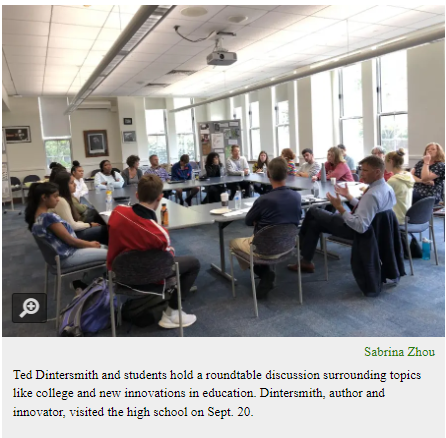
Ted Dintersmith and students hold a roundtable discussion surrounding topics like college and new innovations in education. Dintersmith, author and innovator, visited the high school on Sept. 20.
If you find yourself questioning the way Brookline’s education system is structured, you aren’t alone.
Ted Dintersmith, an advocate of innovation in education and author of What School Could Be, visited the high school on Sept. 20 during G-block. The visit was organized by the Brookline High School Innovation Fund, and it gave Dintersmith and 15 students an opportunity to discuss whether BHS is doing a good job for its students. Later that evening, Dintersmith led a second similar conversation, facilitated by WBUR’s Meghna Chakrabarti, in the Roberts-Dubbs Auditorium.
In discussing improvements needed in Brookline’s education system, Dintersmith and students focused specifically on the way students approached the college application process. In the conversation, Dintersmith and the students believed that the education system should do a better job of letting students explore options other than college and follow their interests more freely.
Dintersmith shared that an alternative to college – a gap year – can be a great idea, financially speaking.
listen “The gap year is for most kids, freshman year in college, where they spend 70,000 dollars to go to a bunch of parties and figure it out,” Dintersmith said. “I would say that most people think that a gap year is expensive; I’ve talked to kids that take a gap year who actually make money during the year, and for some reason people are just really reluctant to even think about that.”
According to junior Jasmine Benitich, with going to college as a norm, it can be difficult to approach alternatives such as a gap year.
“I grew up in a really strict household, so a gap year is never an option we have. It’s kind of a bridge to giving up,” Benitich said. “I don’t think I was ever taught in high school that a gap year is okay.”
Senior Ben Haber added that attending college is commonly what one has to do to succeed.
“There is the rare exception, like Mark Zuckerberg, who dropped out of college, but it is so rare and it’s so hard to ask students, ‘Why don’t you do something bolder, why don’t you do something different,’” Haber said. “I’d love to live in a world where we can all explore what we want to do, but we were born into a world where our education system has so much power.”
Dintersmith emphasized that if students are to go to college, it is important for them to know what they want to get out of their experience.
listen “It’s really easy to say, ‘I’m going to spend all college so that I can get the right job or graduate program. Then I’m going to spend those years so that I get into the right promotion,’” Dintersmith said. “You can do that for year after year after year and end up at my age and say, ‘I never did what I wanted to do.’”
Another area in which schools could improve, according to senior Eva Stanley, is encouraging students to follow their passions.
“Third grade onwards, we start to snap students into formulas, like ‘memorize this verb tense,’” Stanley said. “You get less and less flexibility up until the point in high school where you do have options to explore, but you become so afraid of how that’s going to impact your chances of getting into college, so you’re not going to take risks.”
Dintersmith believes that although college admissions tend to push towards the “routine and formulaic,” students should still remember to follow their interests instead of what everyone else is doing.
“Would you rather do the things you are passionate about and bring that to life in an essay or just keep checking off all those boxes?” Dintersmith said.
Sabrina Zhou
Yuen Ting Chow and Tree Demb
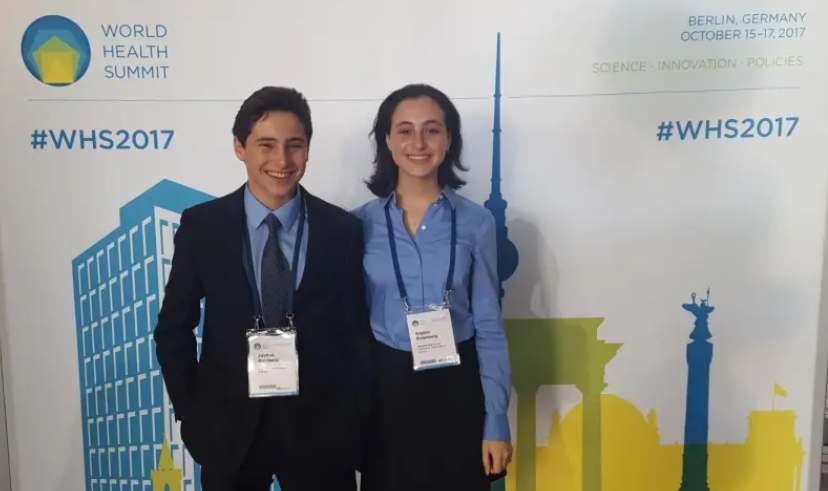
Juniors Josh and Kayton Rotenberg were participants in the high school’s trip to Berlin last October for the World Health Summit. This was just one of many trips the Global Leadership program runs.
Last October, sophomore Zeb Edros found himself surrounded by other people who truly cared about health issues in the world. The catch? He, along with other students from the high school, were the only non-professionals at this conference. Oh, and they were in Berlin.
Every year, students have the opportunity to travel to places such as Amsterdam, Portugal, Nicaragua, Tanzania and Berlin, some in the Global Leadership class, some not, but they all have a shared an interest in world health and learning.
The trips serve as a non-traditional approach for the students to learn and gain experience in a different environment.
According to social studies teacher Ben Kahrl, who teaches the Global Leadership class, the trips function to give the students insight on real situations.
“The trips have two purposes. One is for students to work with and get mentoring from adults who are seeking to solve real-world complex problems. The other is so that they can see these real-world complex problems,” Kahrl said.
According to Edros, who travelled to Berlin for the World Health Summit this past October, the conference was a unique experience for him.
“I think the fact that we were the only students at a professional conference meant that everybody talked to us as if we too were their equals, which let us understand not just more about their fields, but just how to interact with these people in general,” Erdos said. “They answered our questions. They gave us advice on our futures which is really helpful.”
Kahrl believes that the information and skills that the students learn on trips like these will help improve their future and their range of possibilities.
“They {now} have confidence. They can enter the adult world and have conversations with professionals rather than being on the sidelines,” Kahrl said. “Students get exposed to possible careers that they wouldn’t otherwise, simply because they meet people who do things they’ve never heard of.”
According to Kahrl, many of the students who go on Global Leadership trips are in the Global Leadership Class. Sophomore and Global Leadership student Jack Heuberger said that the students do a lot of work pertaining to many different aspects of global problem solving.
“You also learn about situations happening in other countries, such as the Libya slave crisis, and you have to think about ways to possibly solve those problems,” Heuberger said. “It’s about a lot of learning about how the world works and government and how other governments work together, and it’s a lot of critical thinking and collaboration.”
Kahrl said that he hopes to expand the program and give the opportunity of traveling and learning to many more students in the future.
“My goal is that all students, regardless of their socioeconomic background, have a chance to get mentoring from people around the world, and to have an opportunity to travel to places where these challenges are real and immediate” Kahrl said.
Contributed by Kayton Rotenberg
Dan Friedman, Staff Writer

Perspectives of a Mathematical Mind aims to integrate many themes into the one class.
By the end of high school, an average math student can write a geometric proof, solve a quadratic equation and maybe even calculate a derivative. Give the student a traditional math textbook and a sheet of lined paper, and they’ll know exactly what to do — but ask that same student about non-euclidean geometry, game theory, the history of math, or real-world applications of operations and formulas, and you will likely receive a blank stare.
That is, unless you ask students from a senior math class, Perspectives of a Mathematical Mind, which introduces non-algebraic college math and connects concepts with other disciplines such as art, music and history. Through taking the class, students incorporate their own interests with math projects, which deepens their engagement and understanding of the material.
Math teachers Betty Strong and Grace Wang brainstormed the idea for the class after observing a lack of student interest in other algebra-based math classes.
“We would sit around and just be like, ‘it’s such a bummer that students don’t get a chance to see all of this really cool stuff about math,’” Strong said.“There’s so much more to math that kids don’t see.”
After submitting a proposal to the Innovation Fund, then called the Twenty First Century Fund, Strong and Wang received a grant to run the class for three years. After this trial period, the funding for the course was incorporated into the school’s math department budget. The class now covers topics such as tessellations, fractals, art, music and more. Although the class includes some mathematical calculations, the bulk of the class is spent completing other activities.
“We do a lot of group work and presenting, we watch videos, we read articles, we do a lot of discussions, we do a lot more in-depth math investigations,” Strong said.
Although she was already on the advanced math track freshman through junior year, senior Damani Gopal chose to take Perspectives this year, in addition to Advanced Placement calculus.
“I want to study computer science when I’m in college, so obviously the STEM fields are really big in my life,” Gopal said. “Taking a second math was a big benefit.”
Senior Noah Sesling chose to take the class after a presentation given to his Trigonometry and Analysis class junior year. Prior to taking the class, he had struggled to connect class material to his daily life.
“I liked the idea of taking a math class that actually could teach me things that I could apply to the real world,” Sesling said.
For Gopal, learning about other aspects of math has allowed her to extend her existing knowledge of STEM. She particularly enjoyed a unit on game theory, a field of study that is heavily rooted in human psychology.
“It’s the analysis of how two or more parties choose to play a certain game, so it can be like applied to fights like wars, or it can be applied to games,” Gopal said. “There’s a lot of connection to computer science to that. I’ve done game theory independently, so it was lot of fun to do it in school.”
During a unit on math and art, Gopal was able to apply her interest in coding to an end of unit project.
“I made a computer program that depicted tessellations and fractals, so involving coding with math,” Gopal said.
Sesling has incorporated his interest in music with math class. At the high school, Sesling participates in both Camerata choir and the a capella group, Testostatones. For one of his projects, Sesling studied twelve-tone serialism, a form of music composition.
“It basically uses numbers to create melodies,” Sesling said. “I found that really interesting, the way that Perspectives taught me and gave me the resources, and opportunities and open-endedness to actually explore how math and music come together.”
According to Strong, a unique aspect of the class is that it is non-leveled, allowing students who normally don’t interact an opportunity to learn together.
“There’s not a lot of prerequisite knowledge that students need, so we take kids from the college prep level all the way up to the advanced level,” Strong said, “the course is based on each student reaching their own level of mastery, so there’s a lot of individualization.”
For Sesling, taking the class has helped him recognize the significance of mathematical concepts.
“[Before Perspectives] I spent a lot of time memorizing and just trying to think of concepts that didn’t have a meaning to me. This idea of just 1+1=2,” Sesling said. “But with perspectives, it’s a lot more [of] much larger concepts rather than simple small ideas or equations. It’s not like anything you have to memorize, it’s just concepts, like how math would relate to everyday experiences or other forms of art.”
Renata Shen, Staff Writer
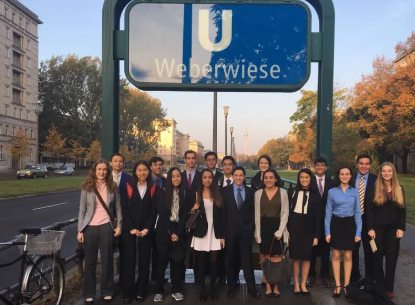
Students posed for a group photo during their time in Berlin. They attended the World Health Summit conference in October.
All teenagers know the anxiety that can come with sitting down next to strangers at lunch. But that feeling of anxiety becomes a lot worse when you are in a foreign country trying to put your plate down next to a full-fledged medical professional.
For 17 students, this was a reality for a week in October. Being given the chance to attend the World Health Summit in Berlin gave these students new experiences and knowledge about global health, global health security, cancer in Africa and other skills.
To be accepted to be a part of the trip, students filled out an application last spring, consisting of multiple essay questions. The 17 students, along with three teacher chaperones, left on Oct. 13.
Junior Katie Rotenberg, one of the students who attended the trip, said that since students are not medical health professionals, the purpose of the trip was to expand their experience in the fields discussed, including medical and scientific fields.
“We went to Berlin for the World Health Summit, which was a gathering of international scientists, doctors, global health leaders, politicians and all kinds of different things, so it was a really great mix of science and global policy,” Rotenberg said.
Social studies teacher Ben Kahrl, who teaches the Global Leadership class, said that one benefit the trip offers for him is the perspective on international health and the views of other countries.
“Boston has huge amounts of medical stuff; it’s world class. But when you go to Germany or Montreal or Portugal, you meet people from all over the world and see how they look at the world differently than us,” Kahrl said.
This trip allowed students to see and meet many professional doctors and politicians who had influence over the medical community. Rotenberg said they met the uppermost people of the field.
According to senior Jerry Chen, being the youngest members of the conference provided the group with unique opportunities.
“We were the only high school students there and we were able to meet so many professionals and famous people you can normally only see on TV or social media,” Chen said.
The conference hall was arranged as a rotunda, with an auditorium in the middle, surrounded by a circular hallway. Keynote speakers held talks in the middle, while conference rooms around the outside of the hallway were for smaller conferences or workshops.
Rotenberg said her favorite speech was made by the princess of Jordan. Since she is a princess and the head of multiple cancer organizations, she uses her authority to administrate others helping find cures, Rotenberg said.
“She was just in the audience two rows behind us, and she gets up and makes this very, very passionate speech about how you can’t begin to have all this high tech stuff in communities until you first have the structure there,” Rotenberg said. “You can’t go and give everyone laptops when they don’t have running water and basic things like that.”
Chen said he thought the most inspiring speaker was the host of a talk concerning cancer in Africa. This speaker talked about his experience and brought his message to the audience.
“He decided to study abroad in England for five years to learn skills to treat cancer, but it was very sad when he came back and realized they wouldn’t have any clinics or technology available in Africa to actually use these skills,” Chen said. “That was very powerful.”
Chen said he didn’t realize how many obstacles there are within public health, including political and technological challenges.
“Before I went on the trip, I wasn’t super interested in public health, but afterward, I felt like it really was our job to make sure that people in the world have access to proper medical care and treatment to their diseases,” Chen said.
Rotenberg said that being part of the conference could be intimidating. Chen agreed that meeting and talking with the professionals at the conference was difficult, especially since they were strangers, but it got easier throughout the week.
“You had to really just go out there and be aggressive. During lunch, put your plate down in front of some scientist and be like, ‘I’m going to sit here now; let’s talk,’” Rotenberg said. “If you didn’t do that, I think you really missed out on a lot of good opportunities.”
The conference helped provide students with the unique experience of learning about possible future career paths. Rotenberg said she probably wants to go into medicine. Chen said he wants to go into medical engineering to research new treatments for Down syndrome.
Kahrl said that being in an environment with professionals who have pursued these dreams for themselves offered a good example for students on how many career opportunities now exist.
“In terms of exploring careers and the breadth of careers, rather than just saying ‘I’m going to be a nurse or a doctor,’ there are all sorts of roles in public health that people can get into,” Kahrl said.
CONTRIBUTED BY JERRY CHEN
Madison Sklaver, Staff Writer
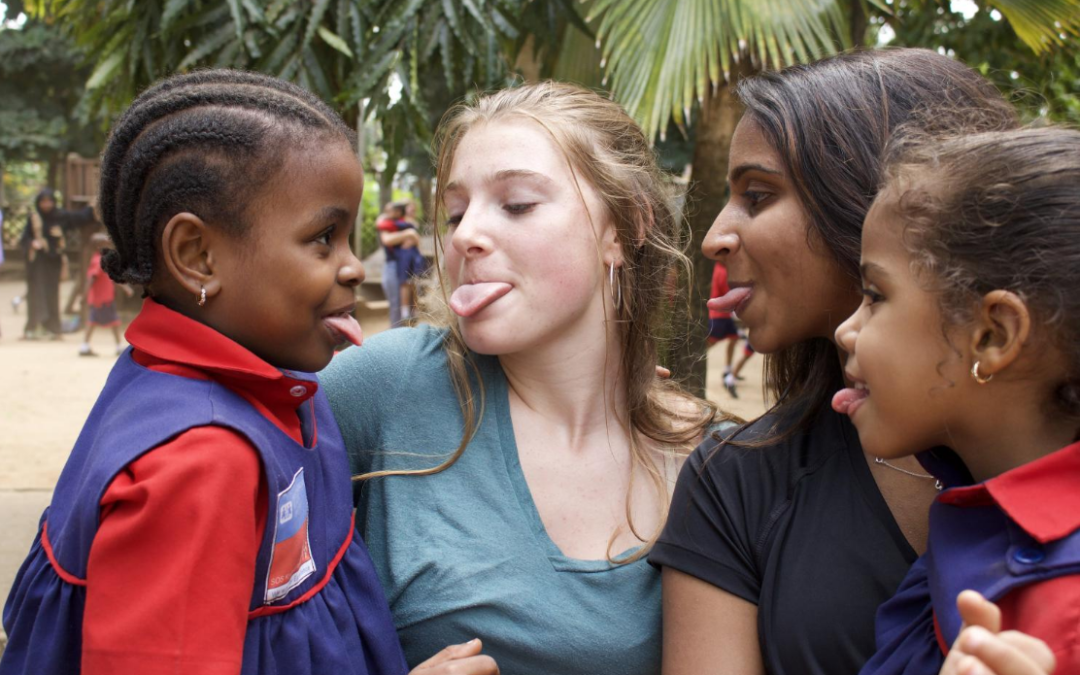
At BHS, there are many different cross cultural trips. The Spanish classes go to Spain and Mexico, Latin to Italy, French to France and the Chinese students on the Chinese Exchange program, just to name a few.
Global Leadership is a full-year elective offered at the high school beginning in 10th grade. Students in the class have the opportunity to go on many trips including to Berlin for the Women’s Health Summit, Copenhagen for the Women Deliver Conference, Montreal for the World Health Summit, London for the Global Health Film Festival and many others. This past summer, a group of students went on a cultural exchange trip to Zanzibar, Tanzania.
Teachers Ben Kahrl, Joanne Burke-Hunter, Stephanie Hunt and Rochelle Joan Mains accompanied juniors Rebecca Downes, Bella Ghafour, Henry Bulkeley, Brian Bechler, Ben Caplan and Hector Cabrera, and seniors Maansi Patel and Hugh McKenzie.
A lot of work goes into planning a trip like this, and according to history teacher and leader of the trip Ben Kahrl, many plans changed due to unforeseen circumstances arising.
“We were going to go to Nicaragua and they had Zika, so we couldn’t go. I had an application to Ethiopia, and riots broke out against the government, so we pulled that application,” he said. “So, trying to find a place that is interesting, different and safe does have some challenges.”
Kahrl said he selected Zanzibar, Tanzania as the destination for the trip because it is a safe and interesting country to visit, and having been there before, he had contacts there.
According to senior Hugh McKenzie, the purpose of the trip was cultural exchange and learning about global health, and also understanding what living in a predominantly Muslim society is like.
“We played soccer with some of the women’s soccer teams because in a Muslim country, it is difficult to have that right. We visited NGO [Non-governmental organization] projects in Tanzania and met with rural locals who are a lot poorer than the people in the main town,” McKenzie said.
Junior Bella Ghafour said that while in Tanzania, they went to a lot of schools and interacted with the students who went there, shadowing classes and participating in different activities with them.
“We went to a bunch of different schools,” she said. “Some were pretty, higher class, and you could see better schools, better desks, better everything, and then there were some that you could see were a lot less fortunate in their resources.”
Kahrl talked about their visit to one of the schools specifically, which was a Muslim school.
“It’s really equivalent to our Catholic schools,” Kahrl said. “I think that when people think Islamic, they think ‘oh my god, madrasa,’ and that means brainwashing, though we would not say the same thing if a kid were sent to a Catholic school here.”
McKenzie spoke about their experiences going to the SOS School and interacting with the students there.
“The SOS School is a school for orphans. It’s probably the best school in Zanzibar and it’s very selective. What we did was we met with the high school students, and we really bonded with them. We understood their lifestyle a little better, and they understood our lifestyle. There was a lot of cultural exchange. Definitely exchange, not just understanding their culture but understanding each other’s.”
For McKenzie, meeting with the SOS high schoolers was the most meaningful part of the trip.
“They live a different lifestyle than us, and they definitely have a different perspective of the world, and things like marriage and sex, which are a lot different in that country,” he said. “The way they see things is very construed towards a Muslim view in an urban setting, and seeing them was so meaningful because it made me reflect on our society and how we see things.”
For Ghafour, the most meaningful part of the trip was visiting the Big Tree school.
“It was one room,” she said. “I guess you couldn’t even call it a room, just a really beat up house that was for 25 kindergarteners and one teacher for the whole school and you could tell that they didn’t have many resources. When we came, we were playing with them, doing the parachute, and the teacher was just so, so happy, and you could see how just small things made them incredibly happy, and it just makes you think about your own life.”
For Kahrl, one of the most powerful moments was when they visited a different Muslim school that he described as being more like religious after school program.
“We heard about the five pillars and then a young man, maybe 12, 14 years old stood up and sang the call to prayer, which I find tremendously powerful even though I’m not Muslim and I don’t understand a word of it,” he said. “I think it is incredibly beautiful, and he sang it through with this incredibly gorgeous voice…At the end, all of the students sang a song, and again I didn’t understand any of it, but it had parts weaving through and it was one of the most beautiful songs I’ve ever heard in my life, and to have Americans see the part of Islam that we don’t see in the news, but is people visiting with people, and both groups really loving it.”
Kahrl hopes to keep this as an ongoing exchange, currently planning trips in February and July.
Ben Mandl, Opinions Multimedia Managing Editor
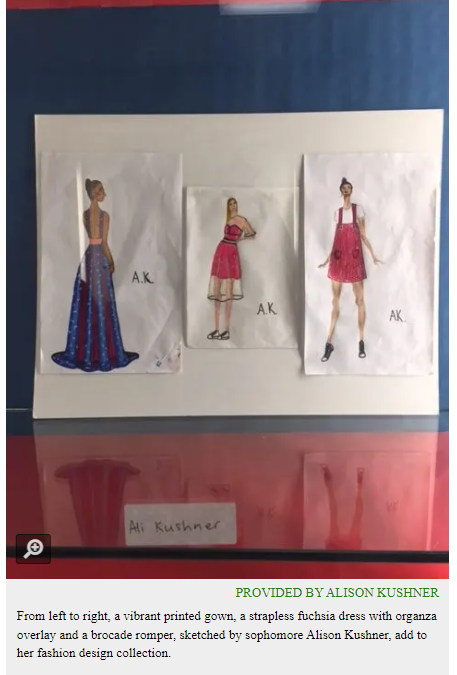
From left to right, a vibrant printed gown, a strapless fuchsia dress with organza overlay and a brocade romper, sketched by sophomore Alison Kushner, add to her fashion design collection.
Her hands continue to sew the dress, tailoring it in the seconds before the model takes the stage. She works fast, ready to move on to several other pieces soon to be displayed to the waiting audience.
Last year, the high school’s 21st Century Fund, which has been responsible for supporting numerous classes and programs at the high school already (such as EPIC and African-American and Latino Scholars) started a new program called the Innovation Fellowship. The fund picks a teacher and allows him or her to teach one fewer class, giving them the opportunity to create new, interesting and innovative options for students to explore and potentially pursue.
English teacher Elon Fischer is this year’s fellow for the program. After hearing of a largely untapped interest in fashion at the high school, Fischer decided to use the resources of his fellowship to help provide more class options to reflect students’ creativity.
After finding a few interested students, he contacted the House of Colors, an arts studio on Washington Street, and got the names of more high school students who work with the studio.
“I called the woman who runs it, Michelle, and we met and we talked, and she introduced me to students in her class,” Fischer said. “That’s how I met with Ali[son] and Basya and we just started talking about things we could do. It was kind of fun.”
According to Michelle Muhlbaum-Aviksis, the owner of the House of Colors, she has worked with students since they were in elementary school.
“I was known mostly to the elementary school students because it’s very easy to access the elementary schools in Brookline,” Muhlbaum-Aviksis said. “So, now the [art students] are getting older and are now in high school.”
After noticing this opportunity in a newsletter, sophomore Alison Kushner began working on the project. Kushner was sewing and sketching from a very young age, learning from her grandmother. After going to the House of Colors, Kushner obtained new skills and applied them to actual fashion shows.
From the group of students interested in fashion design, formed a club. After getting in contact with Kushner, Fischer proposed trying to create a class that reflected her passion with the existing club, and has helped pursue the project.
“He’s been really great with getting us meetings with different teachers like Ms. Brennan, Ms. Mitchell, and organizing different events and meetings,” Kushner said. “He really cares about getting this elective. It’s not just us students; he clearly wants to help us get this elective to be a reality.”
Sophomore Basya Klein, also an aspiring designer, was introduced to the project by Kushner. Klein has been interning for former Project Runway designer Nathalia JMag and working on her portfolio, creating collections that she broadcasts on social media. She explained the obstacles the group faced at first, such as how realistic the demographic for a potential class would be.
“At first, it was a little bit difficult because we did have a different ideas of us coming from the fashion world, and [Fischer] coming from ‘Well how do we get things done?’ side, but once we sat down and talked a few times, we figured out where each of us was at,” Klein said. “It was great.”
In addition to trying to start a class, the club has already put on displays of Kushner’s and Klein’s pieces outside the MLK room.
“[Fischer] is really really good at getting stuff done,” Klein said, “So, that’s been really useful. For someone who doesn’t do fashion design, he’s very passionate about helping us and getting to this place in the school.”
The group hopes to start the class during the 2018-2019 school year. According to Fischer, elective classes are extremely important and valuable to the high school.
“I think if it was a class, it would serve a lot of students who are not currently being served as well as they could,” Fischer said. “The electives in my mind are some of the best parts in this school.”
Kushner emphasizes that anyone can do fashion.
“Fashion isn’t just a cookie-cutter model of a person,” Kushner said. “It’s for anyone who’s interested. You can be male, female, gender fluid. You can be a freshman or senior; it doesn’t matter who you are, it just matters that you have a passion for it.”
PROVIDED BY ALISON KUSHNER
Iman Khan, Arts Writing Editor
Page 9 of 11« First«...7891011»







